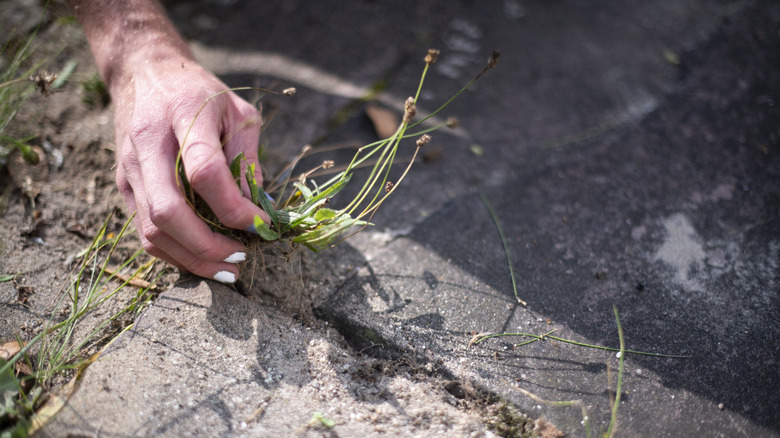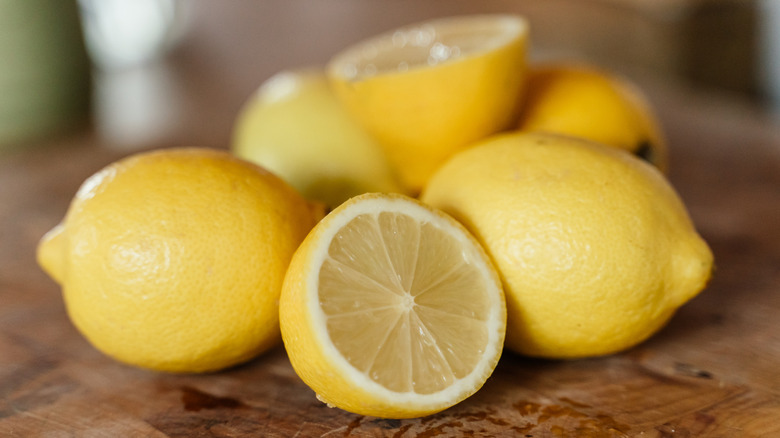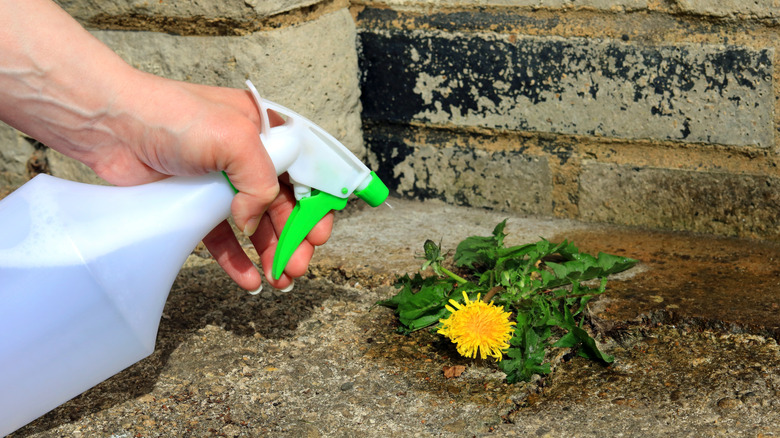This Fruit That's Probably Sitting In Your Kitchen Doubles As A DIY Weed Killer
We may receive a commission on purchases made from links.
Though gardening practices and trends have changed over time, one thing has remained constant: the war against weeds. For decades, the war has been waged with chemicals, namely glyphosate, a potent systemic herbicide. When a plant is sprayed with glyphosate, the chemical affects the entire structure — foliage, roots, and all — killing the weed. But despite the efficacy of products containing glyphosate, there are disadvantages of using herbicides. Concerns around public health and environmental impacts have directed consumers to seek out organic options and home remedy weed killers that are safe, but still effective.
One such DIY alternative uses vinegar and salt as a weed killer, but we have another option that may be sitting on your kitchen counter or in your refrigerator. Lemon juice, which contains a high amount of citric acid — has the potential to weaken weeds above the surface of the soil as quickly as two hours after application. Also, because lemon juice is a natural substance, most crops and plants can usually be grown in the treated soil afterward without negative consequences.
How citric acid in lemons impacts weeds
Citric acid is a naturally occurring compound found in fruit and vegetables, and is what gives lemon its high pH level of 2. And, based on a study published in the Journal of Plant Protection Research, it can be a weed killer. The study, which focused on the herbicidal efficacy in natural products and mulching, reported that applications of citric acid in concentrations of 10%, 15%, and 20% reduced the amount and weight of broadleaf and grassy weeds.
Among the weeds that were sprayed 70 days after being transplanted, their numbers were reduced by up to nearly 80%, and by more than 78% in weight, depending on the concentration of the citric acid. Although these results were less impressive compared to the percentages for acetic acid (one of the main components of vinegar), they still indicate that citric acid can play a role in killing weeds if you're looking for a cost-effective, readily available, and natural herbicide.
In other words, when life gives you weeds, try killing them with lemons. Although solely lemon juice can be sprayed directly onto weeds, adding vinegar can give you an even stronger, more effective solution, based on the study mentioned above. Pour a 1:1 ratio of vinegar and lemon juice (like ReaLemon's 100% lemon juice) into a spray bottle. Adding a few drops of dish soap will help your DIY solution adhere to the plant. Apply the solution on a hot, sunny day to provide an extra "burn" in addition to the acidic content of the spray.
Caveats about using lemon juice on weeds
Before you grab those lemons out of your fruit bowl, here are a few caveats to consider. Lemon juice will only affect the top growth of the weeds, leaving their roots untouched. Within a few weeks of being sprayed, the weeds can regrow. Repeated application will be necessary unless you dig out the roots (which defeats the purpose of using a spray). This DIY spray is also non-selective, meaning it doesn't differentiate between what is a weed and what is your beloved perennial — so spray carefully.
In addition, the high acidity of lemon juice can alter the soil's pH. Since some plants may like either acidic (lower pH) or alkaline (higher pH) soils, a plant that likes more alkaline soil may not thrive in dirt that has been soaked in lemon juice. At the same time, if your soil is more alkaline, but you'd like it more neutral or slightly acidic, the lemon juice may actually benefit your gardening goals. Whether you're working with only lemons or adding vinegar to your DIY weed killer, wear protective gear. No one likes the sting of lemon juice in their eyes or on a cut that went previously unnoticed.


